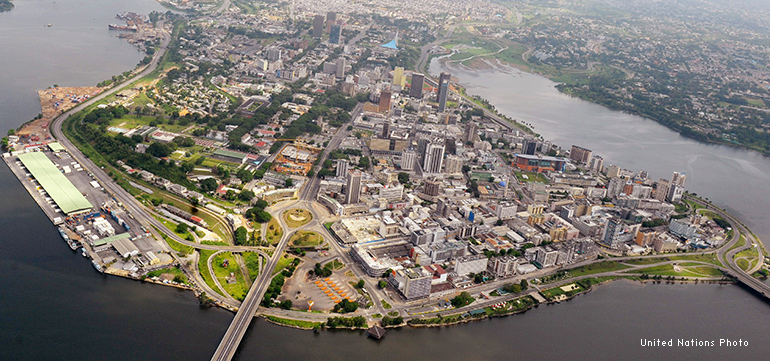Côte d'Ivoire
 Côte d'Ivoire is located in West Africa. Neighbouring countries include, to the west, Liberia and Guinea, to the north, Mali and Burkina Faso, and to the east Ghana. Its coastal region consists of fine beaches, the terrain gradually rises to a smooth forest plateau in the central region and then to upland savannas in the north.
Côte d'Ivoire is located in West Africa. Neighbouring countries include, to the west, Liberia and Guinea, to the north, Mali and Burkina Faso, and to the east Ghana. Its coastal region consists of fine beaches, the terrain gradually rises to a smooth forest plateau in the central region and then to upland savannas in the north.
Abidjan
Abidjan is the economic and former official capital of Côte d'Ivoire while the current capital is Yamoussoukro. The city is considered a cultural hub of West Africa characterised by a high level of industrialisation and urbanisation. The city stands in Ébrié Lagoon, on several converging peninsulas and islands, connected by bridges.
The city grew after the construction of a new wharf in 1931 and its designation as the capital of the then French colony in 1933. The completion of the Vridi Canal in 1951 enabled it to become an important sea port. In 1983, Yamoussoukro was designated as the nation's capital, but most government offices and foreign embassies are still in Abidjan.
Source: Wikipedia
Ethnic groups
There are many ethnic groups in the Republic of Côte d'Ivoire. The major ethnic groups in the country include Akan (42.1%), Voltaiques or Gur (17.6%), Northern Mandes (16.5%), Krous (11%), Southern Mandes (10%). The remaining population is constituted by the Lebanese and French.
Administrative divisions of Côte d'Ivoire
The Republc of Cote d'Ivoire is divided into nineteen regions that are further divided into eighty-one departments.


